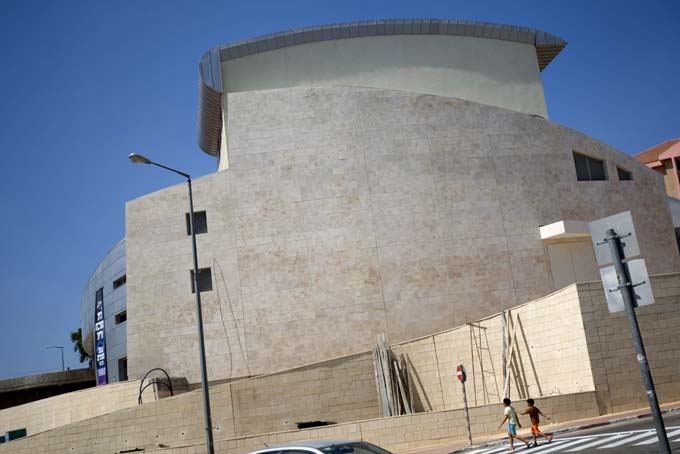
JERUSALEM (AP) — A trio of Israeli stage actors is refusing to perform in an acclaimed play before a theater in a West Bank Jewish settlement, part of a burgeoning domestic movement against the government’s settlement policies.
The protest mirrors a global movement against the settlements that has put Israel’s government in an increasingly difficult situation as the current round of peace talks with the Palestinians continues.
The international community, including the U.S., has long considered Israeli construction of homes for Jews in the West Bank, captured territory claimed by the Palestinians, as an obstacle to peace.
This sentiment, long held also by Israel’s dovish left, now appears to be gaining steam at home following a string of harsh global condemnations of settlement construction in recent months. Some on Israel’s left fear the scale of the settlements soon will pass the tipping point where a pullout may become too difficult, and Israel will be forced to essentially absorb the West Bank and its millions of Palestinians.
In a joint statement, the Cameri and Beit Lessin theaters said that three cast members in their production of “Best Friends” had asked to be excused from performing at the cultural center in Ariel, a settlement built deep inside the West Bank. It said they were granted exemptions and will be replaced by alternates, allowing the show to go on.
One of the actresses, Sarit Vino-Elad, said she could not bring herself to step foot in a theater built on occupied land and which posed an obstacle to peace with Palestinians.
“This is not a boycott. It’s my own little protest against a government policy that continues to build settlements,” she told The Associated Press. “They are trying to make Ariel part of the consensus, but as far as I am concerned it is not legitimate. You want me to perform there? Solve the problem.”
Israel is particularly sensitive to such sentiments as it is constantly battling against international efforts to impose economic, cultural and academic boycotts upon it over the settlements. Defenders of Israel say it is a victim of orchestrated campaigns to delegitimize it and hold it to a double standard over its policies.
But such arguments seem to be facing an uphill struggle. Last week, the American Studies Association, a 3,800-member group of American scholars, endorsed a boycott of Israeli universities.
Previously, the Dutch water company Vitens, the largest supplier of drinking water in the Netherlands, decided to cut ties with Israel’s national water carrier over its operations in West Bank settlements. The European Union recently forced Israel to make guarantees that special European research funds would not be spent in the settlements. The EU is also considering measures to clearly label products made in the settlements, a move that could harm sales.
Lately, Israeli settlements are also coming under increasing scrutiny at home.
Israelis who once considered the West Bank inseparable from the rest of the country, or at least shrugged off the settlements as insignificant, have begun to protest the large government budgets promoting West Bank construction instead of solving a dire housing crisis plaguing the rest of the country. Others refuse to purchase settlement goods or perform reserve military guard duty in the West Bank.
For years, the Palestinians refused to negotiate with Israel while settlement construction continued, saying it was a sign of bad faith. Under heavy U.S. pressure, the Palestinians reluctantly resumed negotiations last summer, under U.S. mediation, with an April target date for agreement.
The Palestinians seek the West Bank, Gaza Strip and east Jerusalem, all captured by Israel in 1967, for their state. Israel pulled troops and settlers out of Gaza in 2005 and it is now ruled by the Islamic militant Hamas. East Jerusalem, with its sites holy to Muslims, Christians and Jews, has been annexed by Israel. The West Bank, despite the fact that Israel builds towns there, has not.
More than 550,000 Israelis now live in areas captured in 1967, amid roughly 2.5 million Palestinians. The Palestinians complain that the growing settler population makes it ever more difficult to partition the land.
The settlement of Ariel is a particular stumbling block. An enclave of nearly 20,000 people is one of the largest settlements, and its defenders say most Israelis want the settlement to be annexed to Israel in any future peace deal. But it is located well inside the West Bank, meaning no minor border adjustment as part of a peace deal could leave it on the Israeli side. Hawkish Cabinet ministers angrily have denounced the protesters and threatened to strip their government subsidies.
In 2010, Ariel inaugurated a glitzy $11 million performing arts center that immediately sparked an artists’ boycott.
Vino-Elad said her colleagues have preferred to stay quiet with their stance for fear of political backlash — but she could not. “We don’t want to create world wars here, we want to make theater,” she said.
The Cameri theater said it was committed to staging the show in Ariel but that it would respect the political positions of its artists.
“The theater does not force its actors to perform in Ariel. Those who are not interested are replaced by their colleagues,” it said in the statement. “The Cameri theater chose to allow its actors to exercise their freedom of expression and follow their conscience.”
Culture Minister Limor Livnat criticized those artists that “boycott Israeli citizens because of where they live.”
Ariel Turjeman, the director of the Ariel theater, played down the protest, saying the actors who refused to perform in the West Bank were a tiny number compared to the thousands who did. He said the theater purchased a play, not an actor, and that the move is little more than a publicity stunt.
“Those who don’t want to come don’t have to,” he said. “If Ariel makes them uncomfortable, they can stay home. And to be honest, we don’t want those who don’t want to come here.”